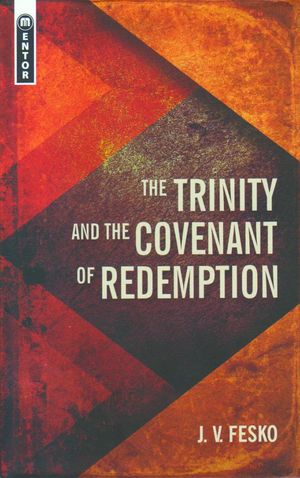Dr Fesko is a professor at Westminster Seminary in California. This Mentor book is the first of a proposed series of three, aimed at retrieving the classic Reformed doctrine of covenants.
This project should meet enthusiastic approval, following current debates concerning covenant theology. Traditional theology has come under flak from Barthian-influenced neo-orthodoxy and pseudo-evangelicalism.
The book is an articulate expression of Fesko’s orthodox scholarship as a Reformed pastor and theologian. The author’s plain style and the clear type make it readable and fluent. Complex subjects are made accessible and those wanting to deepen their understanding of God’s covenant will be rewarded.
The covenant of redemption — God’s eternal covenant, called the pactum salutis (pact of salvation) — and the covenant of works were partially eclipsed in the last century. The latter even came under critical scrutiny from some respected Reformed theologians. Instead of a ‘one covenant’ approach, focusing on the covenant of grace, Fesko presents valid arguments for the continuity of the three covenants — of redemption, works and grace.
Fesko endeavours to revive the biblical doctrines of the covenant of redemption and the covenant of works. The author’s desire is that ‘the church would rediscover the wonder, beauty, and glory of classic Reformed covenant theology’, embracing all three covenants in the process (p.xx).
After a brief preface, there follow three sections: historical origins and developments; exegetical foundations; and dogmatic construction. First, Fesko shows that the concept of the covenant of redemption did not spring out of nothingness following the Reformation. It had predecessors among the Church Fathers, particularly Augustine. Nor was it foreign to the thought of Calvin and Beza, even if it came to prominence later through the likes of David Dickson.
Although Barth’s accusation that covenant theology is a ‘false mythology foisted upon the Scriptures’ by the Reformers (pp. 26-27) is not dealt with in one place, Fesko replies to its misconceptions repeatedly and in convincing fashion.
Fesko then addresses exegetical foundations. Principal texts, such as Zechariah 6:13, Psalm 2:7, Psalm 110, Ephesians 1, etc. are covered. Rather than erratic outcrops, these texts are seen to be constituent parts of the whole of the biblical landscape. Titus 1:2 is a favourite of mine: ‘In hope of eternal life, which God, who never lies, promised before the ages began’.
Who did the Father make the promise to? It was the Son, and concerned eternal life for the elect in exchange for his own, and that before the foundation of the world. I feel Fesko could have brought more grist to his mill from this beautifully meaningful statement.
Part three presents dogmatic construction, stating the doctrine fully and presenting issues involving the Trinity, predestination and imputation. It shows that the integrity of these doctrines is not threatened, but rather complemented by a biblical definition of the covenant of redemption.
As the title of the book suggests, Fesko is particularly concerned with accusations that the covenant of redemption creates divisions in the Trinity. Finally, the link is shown between the eternal covenant and the order of salvation (ordo salutis) of the golden chain of salvation, from election to glorification. This is all heart-warming stuff.
The author concludes: ‘The pactum salutis offers the church an important scriptural rubric to understand how numerous theological doctrines intersect … (it) provides a thicker account of God’s being and work and helps the church to understand a number of scriptural texts’ (p.357). The book is topped off with a valuable bibliography, and subject and Scripture indexes.
In my case, Fesko was preaching to the converted. He opened the window again on biblical panoramas I have long enjoyed contemplating. If you are sceptical of covenant theology, then get this book and discover what you are missing.
Paul Wells
Liverpool







